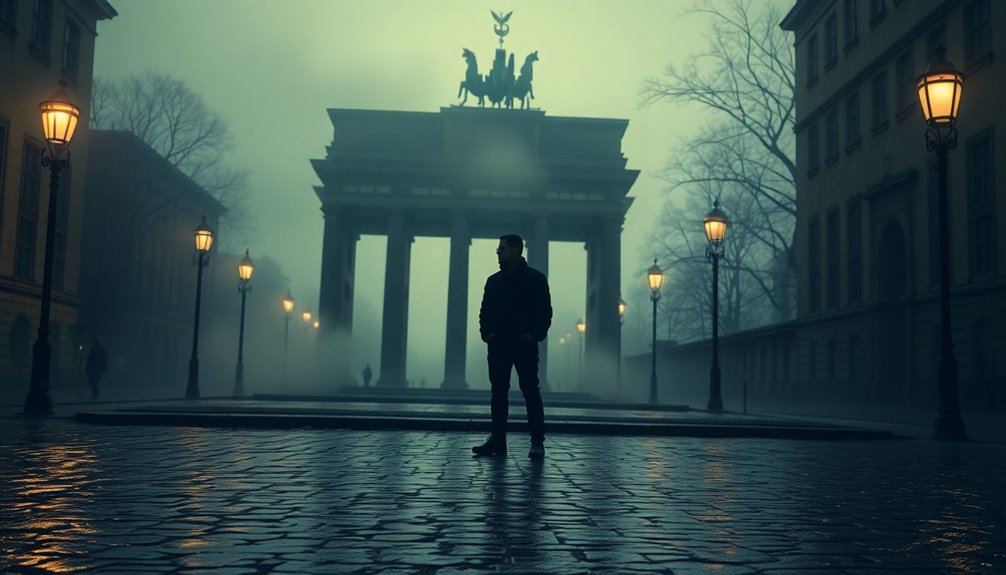In exploring "Alone in Berlin," you uncover the profound themes of courage and defiance against the oppressive Nazi regime. Otto and Anna Quangel's quiet activism, sparked by their personal loss, exemplifies how small acts of resistance can challenge tyranny. Set in 1940s Berlin, their story reflects the fear and resilience of ordinary citizens during a dark historical period. The novel's character dynamics reveal the emotional weight of standing against evil. As you dive deeper, you'll see how these timeless themes resonate with today's struggles against oppression and inspire ongoing discussions around courage and human rights.
Overview of the Novel

"Alone in Berlin," penned by Hans Fallada, thrusts you into the harrowing world of Otto and Anna Quangel, a couple who bravely resist the Nazi regime by distributing anti-Hitler postcards.
Set in 1940s Berlin, the novel captures the oppressive atmosphere of Nazi Germany, where small acts of defiance become powerful symbols of courage. Driven by the personal tragedy of losing their son in the war, Otto and Anna's actions reflect the moral complexities faced by ordinary people during wartime. Their determination to spread hope through their postcards showcases how political action can emerge from profound grief, resonating with the historical importance of collective action against tyranny. Fallada draws inspiration from the real-life Otto and Elise Hampel, highlighting that even amidst tyranny, individuals can inspire change through simple yet profound acts of resistance. The couple's story serves as a testament to the enduring impact of small acts of defiance in the face of overwhelming oppression.
The Quangels' story illustrates how the fight against oppression isn't solely about grand gestures; it's the small acts that can ignite hope and resilience in a dark time. As you explore their journey, you'll witness how courage manifests in everyday choices, reminding you that the battle against injustice can be waged by anyone willing to take a stand, no matter how small their actions may seem. This narrative serves as a powerful reminder of the enduring legacy of political dissent in the face of authoritarianism.
Themes of Resistance
While many associate resistance with large-scale movements, "Alone in Berlin" reveals that profound defiance often emerges from personal grief and quiet determination. In the face of tyranny, Otto and Anna Quangel's small acts of defiance—distributing anti-Hitler postcards—challenge the notion that meaningful activism requires grand gestures. Their story illustrates how personal tragedy, specifically the loss of their son, becomes a powerful catalyst for their courageous resistance against the Nazis. The legacy of such individual actions mirrors the resilience demonstrated by figures like Louis Zamperini, who faced unimaginable challenges during WWII, showcasing the strength of the human spirit.
You see, the Quangels navigate the moral complexities of standing up against oppression in a society filled with fear. Their actions, though subtle, resonate deeply within the fabric of Berlin, reminding you that even the smallest acts can contribute to a larger fight against injustice. In a world where many feel powerless, their journey highlights that individual conviction can spark impactful dissent, echoing the theme of resilience amid adversity found in other narratives of courage during this dark time. As you reflect on Otto and Anna's struggles, you realize that resistance isn't always loud; sometimes, it's a quiet, determined stand against a regime that seeks to silence you.
Their legacy serves as a demonstration of the power of personal courage in the face of overwhelming odds. Moreover, their story exemplifies how personal sacrifices can inspire collective action against oppressive forces, highlighting the importance of individual contributions to broader movements.
Historical Context and Impact

The chilling atmosphere of fear and repression during the Nazi regime serves as a stark backdrop for "Alone in Berlin." Set in the 1940s, the novel immerses you in the daily struggles of ordinary citizens grappling with the oppressive reality surrounding them.
Based on a true story, it follows the courageous couple, Otto and Elise Hampel, who embodied defiance against the Nazi regime. Their real-life resistance efforts, including distributing anti-fascist postcards, highlight the desperate measures individuals took to challenge tyranny. This struggle against systemic oppression parallels the experiences of characters like Bigger Thomas in Richard Wright's "Native Son." Coates' exploration of historical injustices in "Between the World and Me" resonates with the themes of resistance found in Fallada's work.
Hans Fallada, the author, faced his own battles with the Nazis, as he was blacklisted due to his political affiliations. His personal losses during World War I informed his writing, imbuing it with themes of courage and resilience.
The historical context of "Alone in Berlin" resonates deeply with contemporary readers, as it reflects ongoing struggles against oppression worldwide. Since its English translation in 2009, the book's impact has grown, selling around 400,000 copies and sparking dialogue about resistance.
The 2016 film adaptation further underscores the story's relevance, ensuring that the lessons of courage in the face of injustice remain alive today. This aligns with the themes of healing and empowerment found in narratives of resilience, emphasizing the transformative power of standing up against oppression.
Character Analysis
In "Alone in Berlin," character dynamics vividly illustrate the personal struggles against an oppressive regime. Otto and Elise Hampel, as portrayed by Brendan Gleeson and Emma Thompson, become a German couple emblematic of acts of defiance against the Nazi regime. Otto embodies dignity and determination, pushing forward with small protests fueled by grief over their son's death. This resilience mirrors the complexities of marriage, where individuals negotiate power dynamics amidst societal pressures. The historical backdrop of such resistance echoes themes found in other works, like power and corruption explored in "The Daughters of Night."
In contrast, Anna Quangel represents emotional complexity, often grappling with fear and skepticism about their resistance efforts. This tension between Otto's resolve and Anna's concerns reflects the moral dilemmas faced by individuals living under tyranny.
Inspector Escherich, the Gestapo officer, personifies the oppressive regime's relentless pursuit of dissent. His character highlights the fear that shapes actions and beliefs during this dark period in history, illustrating how paranoia infiltrates the lives of citizens.
The ensemble cast further enriches the narrative, showcasing diverse responses to the regime's terror. Each character's journey underscores the emotional weight of defiance, revealing how individuals navigate their convictions while confronting the looming threat of retribution.
Through these character interactions, the film captures the profound struggle between hope and despair in the fight against oppression. Furthermore, the narrative parallels the theme of resilience, as characters demonstrate how hope vs. despair can shape their actions amid societal turmoil.
Legacy and Modern Relevance

Characters like Otto and Anna Quangel illustrate the timeless struggle against oppression, making "Alone in Berlin" resonate deeply in today's context. Their defiance against a brutal regime embodies the courage required for resistance, reminding you that even small actions can challenge authoritarianism.
This novel, published in 1947, has sold over 500,000 copies in English, highlighting its enduring impact on discussions around social justice. The depiction of suburban disillusionment in literature often parallels the struggles faced by individuals under oppressive regimes. Education serves as a crucial tool for overcoming adversity, emphasizing the importance of global education to empower those resisting oppression.
- The Quangels' personal grief fuels their fight against tyranny.
- The portrayal of fear in society underscores the need for vigilance.
- Ordinary acts of defiance can inspire significant change.
- The themes of courage and sacrifice are universally relevant.
- The novel continues to inspire adaptations in literature and film.
- The narrative echoes the themes of psychological suspense found in other impactful works, emphasizing the emotional weight of resistance.
Conclusion
In "Alone in Berlin," courage and defiance blossom like wildflowers through cracks in a concrete wall, reminding us that hope can thrive even in the harshest conditions. The novel's themes of resistance resonate today, urging you to stand against oppression in your own life. Its historical context deepens your understanding, while the characters inspire you to find strength in adversity. Ultimately, this story weaves a timeless tapestry of resilience that continues to influence hearts and minds.



